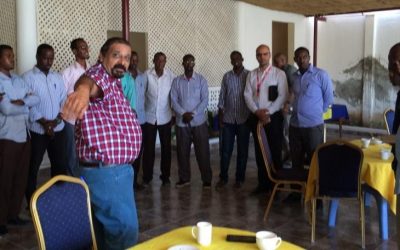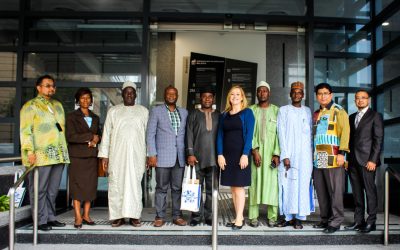Accordemy’s workshop on Advanced Monitoring and Evaluation trained 21 National Volunteers currently serving as M&E Officers. They are part of UNICEF’s humanitarian and development programs in Kassala, Red Sea, Gadaref, Darfur, and Kordofan. The workshop took place in the offices of UNICEF Sudan and was led by facilitators from Accordemy.
The benefits from the Advanced Monitoring and Evaluation Workshop
Processes like monitoring and evaluation are essential and of great importance for development and service organizations. Learning these types of skills will lead to effective company policies and constructive leadership. They will also help with personal and company performance improvements, and also with addressing the proper issues. Therefore, monitoring and evaluation are a vital part of every successful organization.
This workshop provided the participants with:
- First and foremost, with a contextual examples of programme monitoring and evaluation implementation;
- Monitoring and evaluation planning skills that are engaging and evolving;
- The appropriate skills to facilitate programmes on monitoring and evaluation suited to your needs;
- Additionally, the tools to track and asses projects and programs;
- The ability to make informed decisions about the company’s current PM&E processes;
- And last but not least, how to implement the improved processes in the future;
The attendees of this workshop could be from any branch of work because it’s beneficial to employees from any industry. For instance, all from managers, team leaders, NGO members, consultants, CEOs, freelancers, and business owners.

Day one of the workshop
- Firstly, the participants took a pre-test, in order to astablish their knowlegde on monitoring and evaluation;
- Secondly, there was an introduction to Monitoring&Evaluation;
- Then followed a lecture about the importance of Monitoring&Evaluation;
- In addition to that, the participants learned about the components of a Monitoring and Evaluation Framework;
- At the end, they learned about the proper use of Monitoring&Evaluation in development projects or/and programs.
Day two of the workshop
- On the second day, the participants had the opportunity to meet and work with the participatory monitoring and evaluation frameworks;
- Secondly, the met and explored around the logical framework;
- Additionaly, the participants also learned about the strategic framework as well;
- Than the lecture continued by focusing on the logical framework matrix and its content;
- Which was followed by the last aspect of the second day agenda – setting up a project goal and objectives;
Day three of the workshop on Monitoring and Evaluation
- On the third day, firstly, the lectures focused on indicators, source and means of verification;
- Later on, they focused on making the right assumptions in the process of monitoring and evaluation;
- Afterwards, the whole group did some practical work on project scenarios;
- At the end of the third day, the group learned about using Logical Framework Analysis (LFA) for Monitoring&Evaluation projects.
Day four of the workshop
- On the fourth day, the participants learned about monitoring and evaluation plans;
- After that, they expanded their knowledge on developing monitoring and evaluation plans;
- Then followed an extensive lecture on mainstreaming monitoring and evaluation plans with project plans;
- This lecture then continued with an explanation on how to properly implement monitoring and evaluation plans;
- And finally, how to successfully monitor monitoring and evaluation plans after they have been implemented;
Day five of the workshop on Monitoring and Evaluation
- On the last of the Monitoring and Evaluation workshop, the participants focused on data management, after the M&E plans have been successfully implemented in their projects;
- Data collection is the next most important thing in this phase, coming after data management;
- Consequently, after data management and data collection comes the process of data analysis;
- This last lecture also focused on gathering communicating results and their future utilization in project planning;
- Next on the agenda was learning the proper use of Logical Framework Analysis (LFA) in participatory monitoring and evaluation processes;
- The last aspect of this Advanced Monitoring and Evaluation Workshop was the post-test that every workshop participant took in order to see their own progress.

At the end of this workshop, each participant received:
- A certificate of completion issued by Accord Worldwide;
- Lifetime free access to the online version of the workshop material;
- Lifetime free membership in online disscussion groups;
- Discounts on future courses or workshop’s fees;



